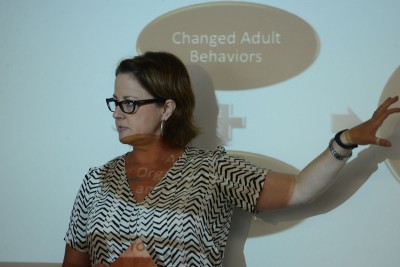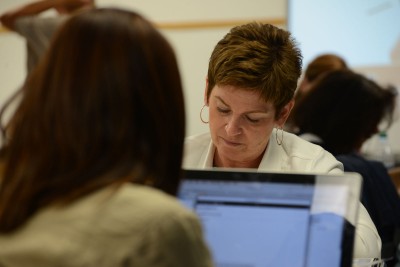Children who take part in early childhood education programs, research shows, are apt to reap the benefits for years to come. Not only are these children more likely to be more successful throughout their years in school, but also “to have jobs and to be contributing members of society” later in life, says Karen List ’83 Ph.D., project director for a new Neag School program designed to help school principals, superintendents, other administrators, teachers, and community members lead their schools, districts, and communities in investing in early childhood education.
In fact, for every dollar invested in early childhood education, there is a $7 return – “much better than returns on Wall Street,” says List, citing findings from James Heckman, American economist and Nobel laureate at the University of Chicago.

And yet many people, List notes, mistakenly equate preschool – particularly in public settings – with daycare. “They don’t see the intentional nature of quality preschool learning or the value in keeping intentional play in a curriculum for kindergartners or first-graders,” she says. “Those opportunities really help kids develop social skills, think creatively, and problem-solve. The capacity that young children have is extraordinary.”
PK-3 Leadership Program
Launched through the Neag School of Education this past summer in partnership with Connecticut’s Office of Early Childhood (OEC), the new PK-3 Leadership Program welcomed 18 educational leaders from districts across Connecticut, including Bridgeport, Torrington, Manchester, Meriden, Norwich, Plainville, and East Hartford, among others.
“If we’re really going to change the outcomes for children, we need more and more people to be knowledgeable about why [early childhood education] is so important – and to have the language to be able to talk about it with credibility.”
—Karen List ’83 Ph.D., project director, PK-3 Leadership Program
The program is specifically designed for elementary school and pre-K school principals and assistant principals; early learning directors and program managers, including child care center directors; and school superintendents, assistant superintendents, and central office directors. A three-year grant through the OEC has helped to assist with development costs and reduce tuition for participants.
Amidst reading assignments, lectures by guest speakers, and classroom discussion, participants in the 10-month program will also spend time collaborating closely with one another to develop early childhood education action plans that they will ultimately endeavor to bring to fruition in their respective communities. The program comprises three focused modules: curriculum and instruction; assessment and evaluation; and leadership for excellence, equity, and early success. While the first component, for instance, centers in part on growing participants’ knowledge base about recent research on brain development in young children, the third component on leadership aims to prepare participants with the ability to communicate the value of early childhood education to stakeholders and to gain consensus.

At the same time, List says, the program engages the participants in considering how they might go on to apply the lessons from each module most effectively in their own districts. “We’re asking them constantly: How does this apply to you? How will you help your community understand that you need to invest in pre-K?” she says. “It’s about having a plan [but also about] how to bring about changes systemically, how to bring people on board, and knowing where to start.”
List, who worked in West Hartford (Conn.) Public Schools for more than 30 years before retiring last year, has long been dedicated to expanding public prekindergarten programs in her former district. Under her leadership as superintendent, the West Hartford district opened preschools in neighborhoods with high poverty rates and the community’s lowest percentage of children participating in early childhood education. As a direct result of List’s advocacy work, West Hartford now has four public, full-day preschools, with five more slated to open in 2016.
Going Beyond Pre-K
Yet quality early childhood education does not stop with preschool. “One of the things we’ve learned over time is that preschool isn’t enough,” List says. “It’s what happens in the preschool as well the alignment, at least through third grade. A preschool teacher needs to understand what a child needs to know by the end of third grade – just as a third-grade teacher needs to know how a young child learns and what is being focused on at a young level with children. So that continuum of learning is very important to sustain the gains made in pre-K. That’s one of the reasons there is this focus [in our program] on the pre-K through 3rd-grade continuum.”
Ultimately, List says she hopes the PK-3 Leadership Program will develop strong leaders who can continue to advocate for the value of early childhood education. “We want the program to be meaningful for our participants,” she says. “We need them to be ambassadors for this work. If we’re really going to change the outcomes for children, we need more and more people to be knowledgeable about why it’s so important – and to have the language to be able to talk about it with credibility.”
“This program is designed to give leaders the skills to help reduce inequities in educational outcomes that occur at the earliest stages of public education,” adds Casey Cobb, associate dean for academic affairs at the Neag School of Education. “Connecticut knows that to redress opportunity gaps, early intervention is critical.”

Cobb is part of a core development team that helped develop the program over the course of the past several years and that includes representatives from the OEC, the Connecticut Association of Schools, the Neag School, and the Connecticut State Department of Education. In addition, List and her team consult with a panel of advisors, composed of experts in the field hailing from the Neag School, as well as other leading research universities nationwide.
“For me, it’s always about what’s in the best interest of children,” List says. “I don’t remember who said it, but in Connecticut, children are approximately 25 percent of our population – and 100 percent of our future. I’ve always wanted to have pre-K to be part of what we do, and now it’s finally happening.”
For more information on the PK-3 Leadership Program, visit pk3leadership.uconn.edu.
 Facebook
Facebook
 Twitter
Twitter
 LinkedIn
LinkedIn
